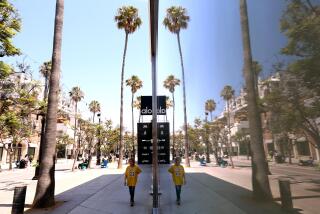Union Agrees to Federal Mediation, but West Coast Ports Remain Closed
In a step toward reopening West Coast ports, the dockworkers union on Wednesday agreed to let federal mediators help resolve a critical contract dispute over the use of labor-saving technology at cargo terminals.
But the ports remained shuttered and were unlikely to open before Friday at the earliest. The Pacific Maritime Assn. said it was not ready to lift the lockout it imposed Sunday, stranding ships from San Diego to Seattle, unless the union guaranteed that it would not engage in work slowdowns.
Without those assurances--which could be accomplished by the International Longshore and Warehouse Union agreeing to extend its expired contract--the shipping lines and terminal operators said they could be forced to close the ports yet again.
“If we went back up again and then shut it down again, we look like a bunch of idiots,” said Joseph Miniace, the maritime group’s president.
Union spokesman Steve Stallone said the ILWU would not agree to any conditions as it enters mediation, which is set to start today at an undisclosed location in the San Francisco Bay Area.
Sen. Dianne Feinstein (D-Calif.) called for President Bush to invoke the Taft-Hartley Act, which would force the ports to reopen during an 80-day cooling-off period, if the standoff isn’t resolved by the end of the week.
“With our nation in the economic doldrums and at the brink of war, we cannot afford to have this dispute cause further damage to our economy,” Feinstein said in a statement late Wednesday.
White House Press Secretary Ari Fleischer said Bush continues to follow the labor dispute closely, but declined to speculate whether or at what point the president would consider intervening. “The administration continues to urge labor and management to come together to get an agreement, because the longer this goes, the more harm it will do to the economy,” Fleischer said.
As efforts to rekindle negotiations got underway, businesses across the country, from toy manufacturers to automakers, continued to suffer from the shutdown of the 29 West Coast ports.
In Fremont, Calif., an auto assembly factory that makes Toyotas and Pontiacs was forced to close for lack of parts. If ships continue to pile up at West Coast ports, many of the nation’s retailers say they are looking at quickly deteriorating profits and thinly stocked shelves this holiday season.
Efforts to resolve the dispute suffered a setback Tuesday when union representatives stormed out of a meeting with federal mediator Peter J. Hurtgen in Oakland. They were angry because Miniace was accompanied by armed bodyguards.
The maritime group said the security was needed because Miniace had received death threats, although Hurtgen said bringing guards to a mediation session was a breach of protocol.
On Wednesday, union officials met again with Hurtgen and described the meeting as fruitful. Later in the day, the union announced that it would accept mediation.
“We felt we owed Mr. Hurtgen the opportunity to explain what he had in mind even if PMA’s inappropriate actions made [Tuesday’s] attempts at talks impossible,” said ILWU International President James Spinosa.
For their part, executives in the highly competitive shipping industry struggled to maintain a show of unity as the lockout dragged on. Privately, several executives spoke of growing disagreement about how hard to push for new technology--the most contentious issue in the negotiations.
Long before contract talks began in May, the maritime group said it would not sign a contract without provisions for introducing bar code scanners, remote cameras, satellite positioning devices and other tools that would speed the flow of cargo. Such advances jeopardize hundreds of union clerical jobs.
The group pushed for such provisions during contract talks in 1996 and 1999, but gave up after the union staged slowdowns. Now some within the employers group are again considering backing down on the technology issue.
“The employers are not feeling the same with respect to this issue,” one executive said.
Another shipping line executive said some companies that have managed to install technology aren’t willing to push hard to allow competitors to easily catch up.
A third said he could not imagine a deal being signed without a technology component, and said shipping companies would expect federal intervention to eventually get the ports back open.
The longshore union said last week that it wanted to take technology off the table, in part because of mixed messages from the employers group.
“You see the difficulty we have of dealing with a group that doesn’t have agreement among its members,” Stallone said. “Each one is trying to tweak the deal in a different way that suits their interests better. That’s why we’re saying put it aside.”
Miniace said, however, that although Pacific Maritime Assn. board members may differ on specific needs for technology, they agree on the need for a new framework for dealing with the union on how new equipment will be introduced. “We have solid agreement on this issue,” he said.
As the union and the employers continued to squabble, more ships arrived off the coast.
A survey of major West Coast ports indicates that at least 145 ships laden with electronics, food, auto parts and other goods await unloading. Dozens more are scheduled to arrive in the next few days.
In the ports of Los Angeles and Long Beach, the third-largest port complex in the world, at least 97 vessels were waiting to be unloaded Wednesday and 30 more were scheduled to arrive in the next two days.
Erik Autor, vice president and international trade counsel for the National Retail Federation, said his members have lost “hundreds of millions of dollars” in revenues and inventory costs.
If the port lockdown continues, he said, retailers may be forced to shut down distribution centers and furlough workers. “Excess inventory is a cost that worsens every day,” he said.
The situation for some manufacturers is not much different.
The Toyota Motor Corp.-General Motors Corp. joint venture in Fremont shut down its assembly lines Wednesday because of a parts shortage, disrupting production of Toyota Corolla sedans and Tacoma pickups and Pontiac Vibe sport wagons.
A spokesman for the venture, New United Motor Manufacturing Inc., said that if the ports were to reopen today, the passenger car line could be running again by Friday morning. But it will be Monday at least before pickup truck production could resume.
Also Wednesday, a national federation of trucking companies joined the ranks of business groups that have asked the White House to mandate an end to the lockout.
The American Trucking Assn. said in an open letter to Bush that the lockout is threatening the nation’s economy and security as accumulating ships “enrich target opportunities for terrorists.”
Meanwhile, at Port Hueneme in Ventura County, police in riot gear were called out Wednesday afternoon when picketing workers tried to prevent a Del Monte ship carrying a load of bananas from leaving the dock.
Tensions boiled over about 2:30 p.m. when workers on the ship tried to pull up the vessel’s gangplank as it prepared to leave for Ensenada.
Angry pickets surrounded one ship worker and started pushing and shoving him when he attempted to draw the ship’s moorings.
Dozens of Port Hueneme and Oxnard police officers, outfitted in riot gear and armed with batons and pepper spray, descended on the docks to restore order. No arrests were made. Del Monte officials have decided to keep the ship at the dock for now.
The Marine Exchange in Los Angeles estimates that since the lockout began, shipping lines have diverted about 10 vessels from Los Angeles-Long Beach, rerouting them to Mexican ports, the Panama Canal or back to harbors where they were loaded.
*
Times staff writers Abigail Goldman, John O’Dell, Maura Reynolds, Evelyn Iritani and Sandra Murillo contributed to this report.
More to Read
Inside the business of entertainment
The Wide Shot brings you news, analysis and insights on everything from streaming wars to production — and what it all means for the future.
You may occasionally receive promotional content from the Los Angeles Times.









